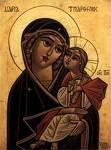
I’m driving my mom around, running errands when she utters a curve ball at me—again.
“Bismasaleeb,” she says.
“Momma, if you say that one more time, I swear I’ll pull over,” I tell her.
“Why? What is your problem, child?”
“You’re insulting my driving!”
“All I said was bismasaleeb. That has nothing to do with you.”
“Yes. It. Does. Mom. You’re basically saying my driving is so bad, only divine intervention could save us from it.”
Let me back up. The word “bismasaleeb” in Arabic literally means “in the name of the cross” (bisma = "in the name of" and saleeb = "the cross"). But when someone says it, whether it’s during a calamity or tranquility, they’re actually asking for the intervention of “the cross.” Copts don’t worship the cross itself, but it is a major symbol within the Church: it is where God sent His only begotten Son to receive the punishment for our wrongdoing, Christians and non-Christians alike… because we are all His children. It is where justice and mercy meet: justice for the payment of our sins and mercy because God has paid the debt, not us. That is why we wear a cross or crucifix pendant around our necks; why we tattoo it to our wrists. It is a constant reminder that our God is a just, but loving and merciful God.
However, the generation gap between those Copts born and raised in Egypt and those second-generation immigrant Copts raised elsewhere tend to call out differently when shock and fright arises. The older generation and those still in Egypt shout out “bismasaleeb!” with all their might, while most Diaspora Copts revert to the generic “Oh my God!” or “Jesus Christ!” Does that mean we will gain less comfort or divine intervention because we couldn’t come up with something more… creative? Or something more true to the Coptic heritage?
I don’t know.
My uncle, who was almost accidently assassinated by members of the Muslim Brotherhood, cannot walk into the room—let alone a building, car, or plane—without making the sign of the cross on the threshold and whisper, “bismasaleeb.” I have yet to figure out if he started this habit because of the assassination attempt that should have been on his brother’s head and not his, or if he’s always done that.
I, on the other hand, have gotten used to English being my more fluent of the two languages. So when my car lost control over three years ago on a major highway, my shock forced me to stay silent as I tried in vain to stop my swerving car. That is, until my car decided to head straight for a concrete median that separated an exit from the rest of the highway. Eyes wide as saucers, I couldn’t help but shout out: “Oh God, oh God, oh God!” And suddenly, my car that had been going an easy 70-75 mph stopped a few feet away from the median with the ease of a car going 5 mph, while smoke bellowed out of the hood. When the shock wore off, I grabbed my leather cross hanging from my rearview mirror, kissed it, thanked God, and leaned my head back, trying to remember how to breathe.
That’s what I’m thinking about as my mom defends herself and her not-so-random use of bismasaleeb. That’s what I’m thinking about when she tells me that I shouldn’t be insulted by the phrase, but embrace it because it is what protects me from the chaos of the world. That’s what I’m thinking about when she tells me that I should start using it myself.
Little does she know that my own, generic English phrase has saved me from myself and my stupid mistakes on several occasions. I guess it couldn't hurt to use that infamous phrase, bismasaleeb, when the setting is right. After all, it all leads back to the same One who took up our cross. It's just a different avenue of calling upon Him.











No comments:
Post a Comment